Indigenous Communities Voice Climate Change Concerns and Solutions at COP29

Indigenous peoples at COP29 voiced their concerns about climate change’s impacts on their communities while showcasing their efforts to combat its effects through traditional ecological knowledge and sustainable practices. By sharing personal stories, they emphasized the necessity for greater recognition and collaboration in addressing environmental challenges.
At the COP29 U.N. Climate Summit held in Baku, Azerbaijan, Indigenous representatives from various communities emphasized the profound impacts of climate change on their lives while advocating for their role as stewards of the environment. Members from places as diverse as Yakutsk, Chile, Ecuador, and Borneo shared alarming accounts of rising seas, contaminated resources, and disrupted ecosystems that threaten their traditional ways of living. These communities, historically resilient and knowledgeable in environmental conservation, also highlighted their ongoing efforts to combat climate change through sustainable practices and restoration initiatives.
The participation of Indigenous peoples at international climate forums like COP29 is critical due to their unique experiences with climate change and their integral role in environmental conservation. Many Indigenous communities disproportionately suffer from the adverse effects of climate change, including extreme weather events, loss of biodiversity, and disruptions to their traditional lands and livelihoods. Their traditional ecological knowledge and practices have proven effective in maintaining environmental balance, making their voices essential in global climate discussions.
The presence of Indigenous peoples at COP29 serves as a powerful reminder of the urgent need to address climate change and collaborate on solutions. Their firsthand experiences reveal the harsh realities of climate impacts, while their commitment to traditional practices offers valuable insights into sustainable living. As these communities continue to advocate for their rights and share their knowledge, the international community must recognize their contributions toward a more balanced and sustainable approach to climate change.
Original Source: apnews.com






